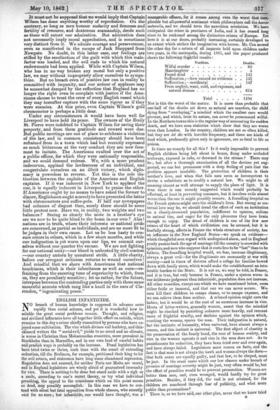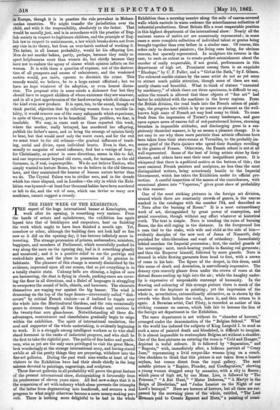ENGLISH INFANTICIDE.
NO branch of human knowledge is supposed to advance more rapidly than social science, and yet it is wonderful how in- soluble the great social problems remain. Thought, and religion, and civilized influences have all together little effect on suicide, which remains to this day a crime chiefly committed by persons who have en- joyed some cultivation. The vice which divines call harlotry, and thin- skinned writers the " social evil," yields to no creed and no climate, is worse in Christian than Mohammedan countries, more prevalent in Stockholm than in Marseilles, and in our own land of careful habits and prudish ways is probably on the increase. Penal legislation has been tried twice or thrice, each time with the result of extending seduction, till the Berliners, for example, petitioned their king to let the evil return, and statesmen have long since abandoned repression. Regulation does not succeed, for neither Paris nor Malta are moral, and in England legislators are wisely afraid of guaranteed immunity for vice. There is nothing to be done but stand aside with a sigh or a smile, according to one's secret theory, or try what individual preaching, the appeal to the conscience which on this point seems so dead, may possibly accomplish. In this case we have to con- tend with silent but fatal opposition from whole classes, who secretly wish for no cure ; but infanticide, one would have thought, was a manageable offence, for it rouses among even the worst that inex- plicable but all-powerful sentiment which philosophers call the horror naturalis, and we should term the unwritten revelation. We have extirpated the crime in provinces of India, and it has ceased long since to be reckoned among the distinctive crimes of Europe. Yet here it is at our doors, probably increasing, certainly developed to an extent which strikes the imagination with horror. Mr. Cox moved the other day for a return of all inquests held upon children under two years, in the metropolis, during 1861, and the paper produced shows the following frightful results :
Total 1104
Nor is this the worst of the matter. It is more than probable that one-half of the deaths set down as natural are murders, the child dying from "overlaying," a mischief which the smallest care would prevent, and which, from its nature, can never be pronounced wilful. In the Northern towns this is the regular way of accounting for sudden death, and we have seen statistics which show that they are worse even than London. In the country, children are not so often killed, but they are let die with horrible frequency, and there are kinds of food which, professedly given only in ignorance, are as fatal to life as poison.
Is there no remedy for all this ? Is it really impossible to prevent English children being left about in boxes, flung under secluded archways, exposed in cabs, or drowned in the stream ? There may be ; but after a thorough examination of all the devices yet sug- gested, we can but pronounce with a deep feeling of pain that the problem appears insoluble. The protection of children is their mother's love, and when that fails men seem as incompetent to devise a substitute as to modify a natural law. We might to all seeming almost as well attempt to supply the place of light. It is true there is one remedy suggested which would probably be effectual, at least in preventing massacre, but it involves evils almost worse than the one it might possibly remove. A foundling hospital on the French system might save the children's lives. But strong as ma- ternal love may be, we should dread the effect of such an institution on a closely-crammed population, indifferent to opinion, callous to natural ties, and eager for the only pleasures they have brain enough to enjoy. The dread of children is one of the few we crimes of the heart of which civilization can be accused, but it is fearfully strong, affects in France the whole structure of society, has an influence in the New England States—we speak on evidence— which thoughtful men regard with undisguised alarm, and in England yearly pushes back the age of marriage till the country is crowded with spinsters, and men who suppose that it coats less to be "fast" than to be fathers. The foundling hospital would, we fear, increase illegitimacy, always, a great evil—for the illegitimate are necessarily at war with society—and in times of distress afford a refuge for families bowed down with family cares, which would make the establishment an into- lerable burden to the State. It is not so, we may be told, in France, and it is true, but only because in France, under a system worse in our deliberate judgment than infanticide, population does not increase. All other remedies, except one which we have mentioned below, seem either futile or immoral, and that one we can never secure. Wo- men kill their children to escape shame, or to escape expense, and we can relieve them from neither. A relaxed opinion might save the babies, but it would be at the cost of an enormous increase in vice. Hosts of letter-writers, generally women,, assert that the mischief might be checked by punishing seducers more heavily, and recount cases of frightful cruelty, and declaim against the opinion which,
crushing the woman, spares the man. Their indignation is natural, but the instincts of humanity, when universal, have almost always a reason, and this instinct is universal. The first object of chastity is the preservation of the family bond, the root of human society, and vice in the woman uproots it and vice in the man does not. As to punishments for seduction, they have been tried over and over again, and have always failed. Legislators must reason on facts, and the fact is that man is not always the hawk and woman always the dove— that both sexes are equally guilty, and that law, to be obeyed, must
be just. In the cruel cases which our law classes under breach of
promise of marriage severity might be just, very often would be, but the effect of penalties would be to prevent prosecution. Women are
better than men, and, even wronged, would hardly try for great penalties. Besides, if they did, the end is not attained, for the children are murdered through fear of publicity, and what more public than prosecutions? There is, as we have said, one other plan, never that we know tried
Verdicts. Deaths.
Wilful murder . • • . ..
66 Manslaughter 5 Found dead 141
Suffocation;—how caused no evidence .
131 Suffocation;—accidental 147
From neglect, want, cold, and exposure, and
natural disease 614
in Europe, though it is in practice the rule prevalent in Moham- medan countries. We might transfer the jurisdiction over the child, and with it the responsibility, absolutely to the father. That would be morally. just, and is in accordance with the practice of Eng- lish society in respect to legitimate children, and the principle of Eng- lish law in respect to maintenance, a law which breaks down not from any vice in its theory, but from an over-harsh method of working it. The father, in all human probability, would let his offspring live. Men do not murder babies, partly, perhaps, because they really re- spect helplessness more than women do, but chiefly because they have not to endure the agony of shame which opinion inflicts on the woman. It is with them a question of expense, not of the destruc- tion of all prospects and means of subsistence, and the weakened motive would, pro tail°, operate to diminish the crime. This remedy would, we believe, be to a large extent effectual ; but we have no hope whatever of its adoption, or even honest discus- sion. The proposal stirs in some minds a dishonest fear lest they should have to support children of whose existence they are unaware, and in all a just apprehension of the hard swearing which all claims of the kind even now produce. It is open, too, to the sound, though we think partial, objection that by relieving women from a terrible lia- bility, it would remove one of the many safeguards which experience, in spite of theory, proves to be beneficial. The problem, we fear, is insoluble. We may, in cases such as those reported this week, where the mother, really betrayed, has murdered her offspring, publish the father's name, and so bring the scourge of opinion fairly to bear, but that would meet only the worst cases, and for the rest we must trust to the old reliance—the gradual influence of teach- ing, social and divine, upon individual hearts. Even in that, we, usually so sanguine of moral influence, find but a vestige of hope; for Christianity, so potent in some directions, seems in this to fail, and our improvement beyond old races, such, for instance, as the old Germans, is, if real, imperceptible. We do not believe Tacitus, who simply wanted to lecture Rome, but we do believe in the old German laws, and they maintained the honour of human nature better than we do. The Crystal Palace was to civilize men, and in the decade which has since elapsed, and in London—the city in which the Exhi- bition was hymned—at least four thousand babies have been murdered or left to die, and the wit of men, which can devise so many new machines, cannot suggest a remedy.































 Previous page
Previous page